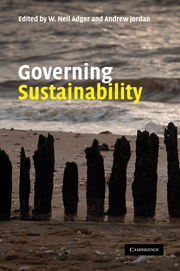Book contents
- Frontmatter
- Contents
- List of figures
- List of tables
- List of contributors
- List of abbreviations
- Foreword by Jonathon Porritt CBE
- Preface
- Part I Overview and Context
- Part II Governance and Government
- 3 Governance, government and the pursuit of sustainability
- 4 How do environmental actors make governance systems more sustainable? The role of politics and ideas in policy change
- 5 Global governance for sustainable capitalism? The political economy of global environmental governance
- Part III Governance and Civil Society
- Part IV Governance and Decision Making
- Part V Conclusions
- Index
- References
5 - Global governance for sustainable capitalism? The political economy of global environmental governance
Published online by Cambridge University Press: 05 June 2012
- Frontmatter
- Contents
- List of figures
- List of tables
- List of contributors
- List of abbreviations
- Foreword by Jonathon Porritt CBE
- Preface
- Part I Overview and Context
- Part II Governance and Government
- 3 Governance, government and the pursuit of sustainability
- 4 How do environmental actors make governance systems more sustainable? The role of politics and ideas in policy change
- 5 Global governance for sustainable capitalism? The political economy of global environmental governance
- Part III Governance and Civil Society
- Part IV Governance and Decision Making
- Part V Conclusions
- Index
- References
Summary
Introduction
This chapter explores the dynamics of environmental governance specifically related to the global sphere – the patterns of environmental rule making and authority which transcend state boundaries. It argues that while such governance is commonly seen in terms of a tragedy of the commons arising out of the anarchy of the interstate system, it is more fruitful to analyse these dynamics in relation to a conception of global capitalism. While efforts to govern global environmental problems started out as attempts to regulate the side-effects of existing forms of capitalist development, they have increasingly been organised to channel capitalism in novel directions. This chapter begins by arguing for this way of understanding global environmental governance in general and charts the shifts in the way that governance regarding the environment has related to trends within the organisation of global capitalism. It then outlines the ways in which contemporary governance can be understood to be pursuing sustainable capitalism. It explores this latter theme focusing primarily on climate politics, both as the most prominent element in contemporary global environmental governance, but also as a key test of the extent to which ‘governing for sustainable development’ can be regarded as being on a successful path. It argues that the key mechanisms that have emerged to promote this sustainable capitalism are those directly working to create new sites of market activity (specifically emissions trading regimes), those seeking to expand market access across the globe (such as the Clean Development Mechanism), and those seeking to shape investment behaviour by large institutional investors (such as the Carbon Disclosure Project).
- Type
- Chapter
- Information
- Governing Sustainability , pp. 99 - 122Publisher: Cambridge University PressPrint publication year: 2009
References
- 7
- Cited by



